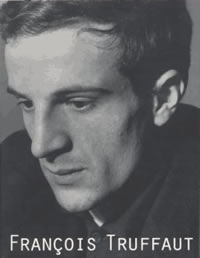
|
Filmmakers
|
 |
|
|
 François Truffaut
François TruffautTruffaut had been a passionate cinephile since his childhood. Under Bazin’s patronage he became a film critic himself, first at the Cahiers du cinéma (of which Bazin was Editor-in-chief), then at the magazine Arts. He rapidly became known (and detested) as an implacable enemy of conventional French cinema, the films of the big studios and the most prominent directors of the 1950s. Toward the end of the decade he began to make films himself, short subjects first, before becoming famous with his first feature film, The 400 Blows (1959), which obtained the prize for Best Director at Cannes.
Like other films by Truffaut (but not all), The 400 Blows is markedly autobiographical. The story of the young protagonist, Antoine Doinel, resembles closely Truffaut’s own experience, to such an extent that his mother and stepfather never pardoned him for the (“unjust”) manner in which they are depicted in the film. Whatever the case, Truffaut made a whole series of films with the actor who represents him in The 400 Blows, Jean-Pierre Léaud, as the young adolescent grows up into adulthood (over a period of twenty years).
Truffaut made other films as well, more than twenty in all. Several of them were highly successful, like the famous Jules et Jim (1962) and Day for Night (1973, Oscar for the Best Foreign Film), L’Histoire d’Adèle H. (1975), Small Change (1976), The Last Subway Train (1980), and The Woman Next Door (1981). Truffaut was also an actor in several of his own films, playing the main role in The Wild Child (1970), Day for Night, and The Green Room (1978). His career was cut short, tragically, by a brain tumor. He passed away in 1983 at the age of 52.
Filmography
1958 The Brats (short subject)
1959 The 400 Blows
1960 Shoot The Piano Player
1962 Jules et Jim; Antoine et Colette (second episode of the Doinel cycle, short subject in the collective film, Love At Twenty)
1964 Soft Skin
1966 Fahrenheit 451
1967 The Bride Wore Black
1968 Stolen Kisses (third episode of the Doinel cycle)
1969 La Sirène du Mississippi
1970 Domicile conjugal (fourth episode of the Doinel cycle); The Wild Child
1971 The Two Englishwomen and the Continent
1972 A Beautiful Girl Like Me
1973 Day For Night (Oscar for the best foreign film)
1975 Histoire d’Adèle H.
1976 Small Change
1977 The Man Who Loved Women
1978 The Green Room
1979 Love In Flight (fifth and final episode of the Antoine Doinel cycle)
1980 The Last Subway Train
1981 The Woman Next Door
1982 Vivement Dimanche